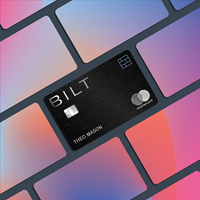Bilt

Product Name: Bilt
Product Description: Bilt is a loyalty program that rewards you for paying rent. As you earn points by paying rent, you unlock tiers for additional rewards. At the start of the month, on "Rent Day," you can earn even bigger rewards like higher points back on dining, travel and other purchases. There are also limited time offers that rotate each month.
Summary
Bilt was founded in 2015 by Ankur Jain. He previously founded Kairos, an investment firm, and Humin, a technology company that was acquired by Tinder.
Overall
Pros
- May earn rewards paying rent
- Potential to build credit history
- Solid rewards structure
- “Rent Day” promotions are great
- No annual fee
Cons
- No sign up bonus
- Must use card 5X per billing cycle to get rewards
- Not all renters can have their rent reported to the major credit bureaus
- Less useful if you don’t pay rent
One of the biggest expenses in anyone’s budget is their housing.
Experts recommend keeping housing to a maximum of 30% of your income – 30% is a big chunk! And many times we pay rent with a check or draw on your checking account, a way that earns us nothing in terms of rewards (and many times, nothing in terms of building credit).
What if I told you there’s a way to earn rewards on one of the largest expenses in your budget?
There is and it’s called Bilt.
Table of Contents
🔁 Updated October 2024: For Rent Day, Bilt has limited the amount of bonus points you can earn to 1,000 – down from 10,000 starting on October 1st. Also, it appears their monthly trivia game is no longer available. The Rent Free game is still running.
Bilt also added a Bilt Neighborhood Pharmacy Program in partnership with Walgreens as well as two new transfer partners, Accor ALL and Tap Air Portugal Miles&Go.
What is Bilt?
Bilt is a no-annual fee World Elite Mastercard that offers a rare perk – you can earn 1X points on rent payments without a transaction fee (maximum of 100,000 points per calendar year). Normally, if you try to pay rent with a credit card, your landlord will add on a transaction fee that negates any rewards.
With Bilt, they will send your landlord a check or bank payment via ACH so your landlord doesn’t see a credit card transaction and charge you a transaction fee.
The Bilt card has other perks too (once you make at least 5 posted transactions each statement period):
- 3X points on dining
- 2X points on travel
- 1X points on other purchases
(one little quirk, if your rent is under $250, you earn 250 points)
On “Bilt Rent Day,” which is the 1st of each month, you earn a higher rate (more on Rent Day below):
- 6X points on dining
- 4X points on travel
- 2X points on other purchases (excluding rent)
Starting October 1st, Bilt limits the amount of bonus points you can earn to 1,000 – down from 10,000.
How Bilt Can Help Build Credit History
Not everyone who pays their rent with Bilt is able to have their rent reported. If your landlord is part of the Bilt Alliance, then your rent payment is eligible to be reported to the credit bureaus (all of them – Experian, TransUnion and Equifax).
If you aren’t, unfortunately Bilt won’t be able to help you with that aspect of the service – you are still earning rewards points though.
What is Bilt “Rent Day?”
The biggest perk of the Bilt card is their Rent Day offers.
Rent Day is the first day of every month and on this day you earn special rewards when you use their card (as we’ve mentioned before):
- 6X points on dining
- 4X points on travel
- 2X points on other purchases (excluding rent)
You earn double points on the special categories on up to 1,000 Bilt Points.
Other perks can include:
- SoulCycle Rides – You can book a SoulCycle class and receive a complimentary bike for a friend – rides start at 2,600 Bilt Points (or earn 10X points when you book through their app)
- Point Quest game – Where you can earn bonus Bilt points
What If My Landlord Doesn’t Take Bilt?
That’s OK – you can still pay by setting up an ACH transfer or they will send a paper check to your landlord (or property manager) on your behalf. You don’t actually pay with a credit card (important, especially if your landlord charges a fee to use credit cards), but you use Bilt and they send payment for you.
Other Bilt Travel Protections & Perks
Bilt also offers travel protections that are extremely valuable (especially during the pandemic era):
- No Foreign Currency Conversion Fee – terms & conditions
- Trip Cancellation and Interruption Protection
- Trip Delay Reimbursement
- Auto Rental Collision Damage Waiver
- Purchase Security (theft and damage protection)
- Cellular Telephone Protection
- Concierge Service
- Lyft Credits
Bilt Neighborhood Pharmacy Program
At Walgreens, you can earn Bilt points when you use any debit or credit card linked to your Bilt account.
You can earn 1X Bilt points on general purchases and 2X on Walgreens branded products. You get 100 points on prescription refills – all on top of the credit card rewards you normally get with that card.
Afterwards, Bilt can identify FSA and HSA eligible items and apply funds with one click within the Bilt app. A credit is then applied to your original purchase card.
Bilt x BLADE Partnership
Announced in April 2024, Bilt has partnered with BLADE, which is an app that offers transportation by helicopter, to offer some interesting perks for folks who live in an area where BLADE is available.
Platinum members get a complimentary BLADE helicopter flight between the Manhattan lounges and JFK or Newark each year. Coming for this summer, it’ll also be available for travel between Monaco and Nice. Must be nice!
Platinum and Gold members get access to the BLADE lounge in New York City even if you aren’t flying.
Finally, everyone earns 2X Bilt Points on Blade bookings and Platinum, Gold, and Silver members get a 10% discount.
Bilt Dining Perks
Bilt offers this nice dining perk too:
- World Elite Mastercard Concierge – Whether you need hard-to-find dinner reservations, the perfect last-minute gift or insider hotel recommendations, the World Elite Mastercard Concierge will work behind the scenes on your behalf – anywhere in the world.
Other Bilt Perks
Finally, there are a few other perks that don’t fall under dining and travel but are hugely important, including:
- Cellular telephone protection – Pay your monthly cell phone bill with your Bilt Mastercard® you’ll get up to $800 of protection (subject to $25 deductible) against covered damage or theft.
- Purchase security (Theft and damage protection) – Purchases made on the Bilt Mastercard® can be covered for theft or damage within 90 days of the date of purchase, up to $10,000 per claim.
Bilt Rewards Tiers
The Bilt Rewards program has tiers, based on how many points you accrue each year:
- Bilt Blue – starting tier
- Bilt Silver – 50,000 points per year or $10,000 through spend
- Bilt Gold – 125,000 points per year or $25,000 through spend
- Bilt Platinum – 200,000 points per year or $50,000 through spend
Or based on eligible spend, excluding rent, on a linked debit or credit card or the Bilt Mastercard (excluding rent).
| Perk | Bilt Blue | Bilt Silver | Bilt Gold | Bilt Platinum |
|---|---|---|---|---|
| 1:1 point transfers with airlines & hotels | ✅ | ✅ | ✅ | ✅ |
| Access to the Bilt Collection | ✅ | ✅ | ✅ | ✅ |
| Build credit history with Bilt Alliance | ✅ | ✅ | ✅ | ✅ |
| 10% bonus on lease incentive points from participating properties | ✅ | ✅ | ✅ | |
| Interest earned on points | ✅ | ✅ | ✅ | |
| Homeownership Concierge | ✅ | ✅ | ||
| Exclusive gift from The Bilt Collection | ✅ |
Bilt Milestone Rewards
Sometimes the difference between the Bilt reward tiers can seem big so they’ve started adding Milestone Rewards, or rewards you can claim for every 25,000 points you earn. The jump from Bilt Blue to Bilt Silver is 50,000 points, so this means you can pick a reward halfway and you don’t have to wait the whole difference between you get additional rewards.
Here are some example rewards:
- Double points on Bilt Dining for 7 days – Earn double points (up to 1,000 bonus points) at Bilt Dining restaurants using any linked debit or credit card. This is in addition to your usual card rewards, only the Bilt Dining multiplier is doubled
- 1,000 points for the Bilt Collection – Get 1,000 points to use towards purchasing a piece from our hand-curated catalog of art, decor, and apparel.
- 10X on your next 3 Lyft rides – Earn 10X points on your next 3 Lyft rides (up to $25 of Lyft rideshare spend) when your Bilt and Lyft accounts are linked.
- Get 5,000 points closer to the next status – Get 5,000 points towards your progress towards your earn-based status, bringing you closer to more exclusive benefits.
- $10 towards your next fitness class – Get $10 off a fitness class at some of the nation’s top group fitness studios when you book through the fitness tab on the Bilt app.
- Free item from the Bilt Collection – Choose any item from our hand-curated catalog of art, decor, and apparel.
If you are a Bilt Mastercard holder, you get access to additional reward options:
- 2X on groceries at grocery stores for 30 days – up to 1,000 bonus points
- 2X on gas at gas stations for 30 days – up to 1,000 bonus points
- 2X on sports & concert tickets for 30 days – up to 1,000 bonus points
- 2X on digital wallet purchases for 7 days – up to 1,000 bonus points
One caveat on the Bilt Mastercard rewards, you need to use the card at least 5 times each statement period to get the bonus points.
Bilt Rewards Program
What can you do with the Bilt rewards points?
- TRAVEL: transfer Bilt Points to their airline and hotel partners at a 1:1 ratio
- BILT TRAVEL PORTAL: access to Expedia’s entire travel inventory
- FITNESS: redeem Bilt Points for classes at Soul Cycle, [solidcore] or, Y7 studios
- SHOPPING: use your Bilt Points to cover all or part of your purchases with Amazon
- LIFESTYLE: use your Bilt Points for home decor from the curated Bilt Collection
- RENT: redeem your Bilt Points for all or a portion of your next month’s rent
- HOMEOWNERSHIP: put your Bilt Points towards a portion of a future downpayment on a home purchase
Who are Bilt Transfer Partners?
Bilt partners with several airline and hotel partners so you can transfer your Bilt points to those partners, typically on a 1-to-1 ratio. Periodically, during Bilt Rent Days, they may offer bonuses on some transfers. For example, the February 2024 Bilt Rent Day featured a 75% to 150% bonus on transfers to Air Canada’s Aeroplan, dependign on your Bilt status level.
The Bilt transfer partners are:
- Accor ALL – New for 2024
- Air France/KLM Flying Blue
- Air Canada Aeroplan
- Alaska Airlines Mileage Plan (added March 2024)
- British Airways Avios
- Emirates Skywards
- Hawaiian Airlines HawaiianMiles
- Hilton – New for 2024
- IHG One Rewards
- Marriott Bonvoy
- United MileagePlus
- Tap Air Portugal Miles&Go – New for 2024
- World of Hyatt
Is the Bilt Card Worth it?
If you are paying rent, this seems like a great way to earn 1X points on rent without much added effort. When I was renting (in the early 2000s), my share of the monthly rent was $1,200 and that would’ve meant an additional $12 each month (or $144 a year) in rewards available to me.
This, on top of all the monthly promotions, makes this card very appealing especially since there’s no annual fee.
I have to pay rent anyway so I might as well earn rewards while I’m doing it



